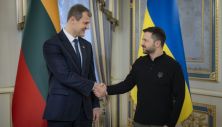The European Union’s recent decision to allocate $440 million for reviving Ukraine’s defense industry marks a major shift in its response to Russia’s war. However, it also reveals the EU’s defense sector struggles in producing weapons and ammunition, The Washington Post reports.
The EU funding will come from profits on frozen Russian assets, adding to $190 million already pledged by Denmark.
While Europe and the U.S. provide billions in military aid to help Ukraine resist a much larger Russia, their defense industries, designed for peacetime production, struggle to meet Ukraine’s needs.
“There is a realization that Europe cannot produce the weapons Ukraine requires, so it’s easier for Ukrainians to do it themselves if they have the materials and funds,” said an anonymous European diplomat.
However, this funding won’t replace the significant supply of Western-made weapons to Ukraine, noted Jan Lesser, head of the Brussels office of the German Marshall Fund. “This is simply the reality of Ukraine’s security situation,” he added.
European leaders are increasing defense cooperation with Ukraine and working to secure aid amid the ongoing war, preparing for potential challenges such as a possible Trump presidency, reduced U.S. support, and public fatigue.
Ukraine’s Defense Minister Rustem Umyerov stated that around $4 billion has been allocated for developing the country’s defense industry this year. However, Economy Minister Yulia Svyridenko believes the sector could produce even more, estimating up to $10-12 billion.
An unnamed European official described the funding as a turning point, not for its size but because it represents public investment in Ukraine’s defense sector. The official added that funding may increase significantly soon. Nevertheless, Ukraine’s defense industry remains far from rivaling Russia’s, and significant Western aid will be needed in the coming years to defend against Russian aggression and reclaim occupied territories, analysts from ISW stress.
Ukraine has already signed contracts with major defense companies like Germany’s Rheinmetall and the Franco-German group KNDS, which opened an office in Kyiv last week. KNDS and other Western firms are partnering with Ukraine to produce 155mm NATO-standard shells, urgently needed on the front lines. While Ukraine has started manufacturing these shells, production remains limited.
“Partnering with Ukrainian firms offers foreign defense companies key benefits, such as adapting and testing products in an active conflict,” The Washington Post concludes.
Read also: NATO to re-think future relations with Russia – Politico













